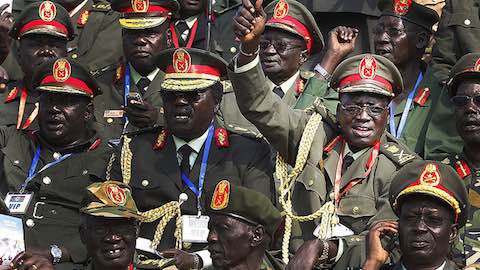- MENU
- HOME
- SEARCH
- WORLD
- MAIN
- AFRICA
- ASIA
- BALKANS
- EUROPE
- LATIN AMERICA
- MIDDLE EAST
- United Kingdom
- United States
- Argentina
- Australia
- Austria
- Benelux
- Brazil
- Canada
- China
- France
- Germany
- Greece
- Hungary
- India
- Indonesia
- Ireland
- Israel
- Italy
- Japan
- Korea
- Mexico
- New Zealand
- Pakistan
- Philippines
- Poland
- Russia
- South Africa
- Spain
- Taiwan
- Turkey
- USA
- BUSINESS
- WEALTH
- STOCKS
- TECH
- HEALTH
- LIFESTYLE
- ENTERTAINMENT
- SPORTS
- RSS
- iHaveNet.com: Africa Current Events

To Save South Sudan, Dump the Warlords (Photo: Steve Evans / Flickr Commons)
By Christopher W. Douglas
While the international community propped up kleptocratic generals, South Sudan's social entrepreneurs took matters into their own hands. The future of the country belongs to them.
It’s cruel and dishonest to call South Sudan a “failed state” whose people have “little to celebrate” on their fourth Independence Day, which passed by earlier this July. The failure is one of state building -- and of building the wrong state.
After years of bitter internecine conflict in the country, those same international governments and agencies pronouncing South Sudan kaput share responsibility for this failure with South Sudan's current government.
The United States and other countries sent immense resources to South Sudan's generals-turned-statesmen, seeking to prevent another war with Sudan or, worse yet, a Somalia-like environment for terrorists. They couldn’t or wouldn’t see that many of those generals, possessed of a lust for power, were still at war with Sudan-sponsored militias. Soldiers in the South Sudanese army, meanwhile, were becoming ever more impatient for the peace and prosperity promised after decades of bloodletting.
Whatever the donors intended, too much money went into political coffers, military hardware, and infrastructure for the oil industry.
Then-Secretary of State Hillary Clinton explained the international community's tolerance for this mismanagement in 2012. “A percentage of something is better than a percentage of nothing,” she said, meaning that a minimally functional but increasingly kleptocratic and authoritarian-leaning government was better than the violent turmoil another U.S.-backed intervention had just unleashed in Libya.
Who will stand behind that reptilian zero-sum logic today, as lives and property are destroyed throughout South Sudan by the private armies of those seeking the biggest share of the country's oil revenue? If the wasted scientific, cultural, and economic potential isn't chilling enough, there's also the threat of incubating the next Lord's Resistance Army, Boko Haram, or Ebola strain.
Signs of Hope
Despite all these mistakes, a peaceful and stable South Sudan is still within reach, if South Sudanese civil society groups are assisted in building on their existing social, economic, and democratic activities.
South Sudanese cooperatives and entrepreneurs show one way forward. River Nile International and the Lulu Works women's co-op just sent their country's first export to the United States: 100 percent natural honey and shea. The South Farmers Company is connecting local poultry farmers with hungry markets, like Kenya's One Hen Campaign. Jewelry and artwork from the women of the Roots Project has debuted at New York fashion shows. The Savannah Farmers Cooperative set up and runs the country's first major grain mill.
Countless others are developing their own innovative social businesses for waste collection, cleaner cooking fuels, construction, farm-to-market restaurants, and taxi services.
South Sudan's social entrepreneurs are bold, earnest risk takers who could team up with their peers in the United States to meet their country's needs for food, education, and medical care. They can bring new goods and services to the global market and drive East Africa's economic development. But they first need improved access to investment, mentors, and equipment.
Representatives from South Sudan's myriad ethnic groups are already organizing their own peace conferences, not just for everyday disputes but even the ongoing civil war. Their consensus could be far more binding and authoritative than any ephemeral agreement negotiated by the warlords.
South Sudan's civil society could accomplish even more if the international community supported the creation of a new national constitution and a mandate allocating oil revenue to necessities like education, medical care, and infrastructure. The Alaska Native Claims Settlement Act, which helped settle land claims and spur economic development among indigenous Alaskan groups, could serve as a model.
Path to Stability
It's important not to lose sight of the possible spoilers: those who benefit from South Sudan's prolonged misery. Some remedy must lie in the carrot-and-stick diplomacy behind the 2005 Comprehensive Peace Agreement and the 2011 referendum that produced the country’s independence.
Here is where Clinton's “better-something-than-nothing” approach holds true, since most parties would benefit from stable production and trade. Local fighters want economic development for their families. Sudan and China want South Sudan's oil to keep flowing. Sudan's president Omar al-Bashir needs South Sudan's oil pipeline payments to keep himself alive and in power.
No single product or project can “save” South Sudan, and nobody can turn a “bad government” into a “good” one. Some groups might even be happy with the status quo. But international partners can help what's already good in South Sudan become even better by building on the existing social, economic, and democratic activities.
Over many generations this kind of approach could build a country the right way: enterprise by enterprise and community by community.
WORLD NEWS & CURRENT EVENTS ...
WORLD | AFRICA | ASIA | EUROPE | LATIN AMERICA | MIDDLE EAST | UNITED STATES | ECONOMICS | EDUCATION | ENVIRONMENT | FOREIGN POLICY | POLITICS
Article: Republished with permission of Foreign Policy in Focus.
Africa - "To Save South Sudan, Dump the Warlords"